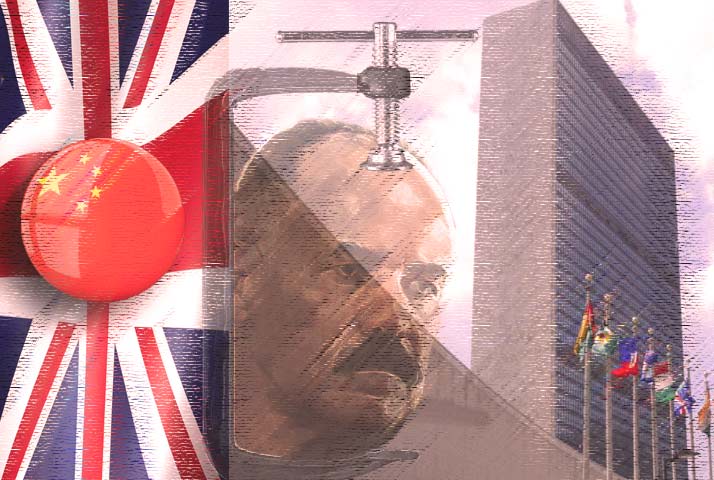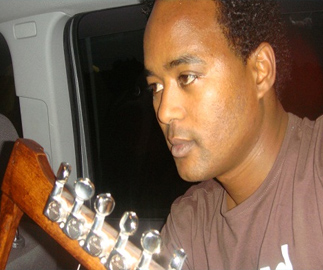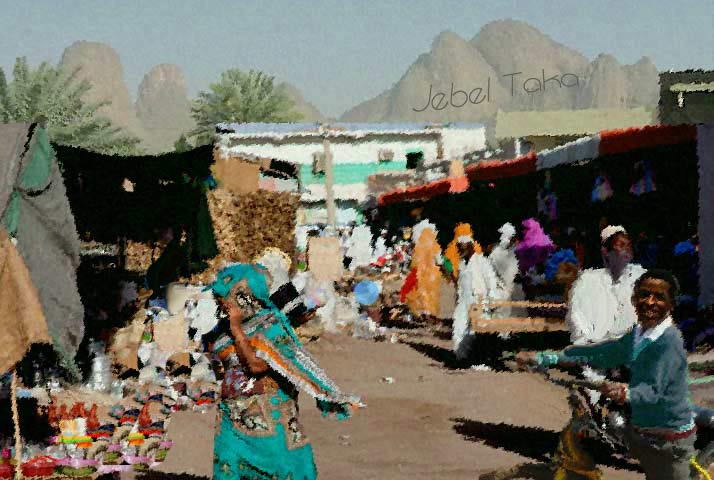Sanctions on Eritrea: Will They Or Won’t They?

1. It’s sanctions season, and the question is “will they or won’t they?” Will the UN Security Council (UNSC) extend sanctions on the State of Eritrea or will they lift it? We will have more information in June when the Monitoring Group on Somalia and Eritrea (SEMG) publishes its report and we will know for sure in November when the UNSC votes on it. But, for those of you who can’t wait that long, on April 13, there was a discussion of the oral report presented to the Sanctions Committee by the Monitoring Group. The SC session was presided over by the president for April (US) and the new chairman of the Sanctions Committee is Kazakhstan.
2. I know what you are thinking: every time I have tried to watch these things, they are almost two hours long; a lot of it has nothing to do with Eritrea, and I don’t know how to fast forward through it. Luckily, there is a solution for that. Do you have 50 minutes? Then head on to Eritrea Daily, which has edited the video to include only the parts that deal with Eritrea.
3. This takes us to the “Will They” or “Won’t They” speculation. Some dots:
4. In its November 2016 decision to extend the sanctions for one more year, the Security Council had made these calls on Eritrea:
- Reiterates its expectation that the Government of Eritrea will facilitate the entry of the SEMG to Eritrea
- Underlines that deepened cooperation will help the Security Council be better informed about Eritrea’s compliance with the relevant Security Council resolutions;
- Urges the Government of Eritrea to facilitate a visit of the SEMG to Eritrea;
- Calls on Eritrea to cooperate fully with the SEMG
- Stresses its demand that the Government of Eritrea allow access and make available any detailed information, including to the SEMG, pertaining to the Djiboutian combatants missing in action…
5. Notice that none of these have anything to do with Somalia or whether Eritrea is supporting Somali armed groups. All of them are the same call using different action verbs– reiterates, underlines, urges, calls on, stresses– that the Government of Eritrea allow the SEMG to make a visit to Eritrea. Yet, those who demand that the sanctions be lifted keep arguing that there is no evidence that Eritrea is supporting Al-Shabab; therefore, the sanctions must be lifted (as if that was the only reason for the sanctions.)
6. The Government of Eritrea has made the following points with respect to SEMG visit: (a) We allowed them in twice (time never specified–because it wasn’t the SEMG that was allowed in); (b) We have held numerous conversations with them offsite or via video conference; (c) We are not going to allow people in on a fishing expedition.
7. Whether the UN Security Council bends on its demand (stated five times in the last resolution), or holds firmly to it, is dependent on many factors–some that we know and some that we don’t know. One of the ones we know (or have a firm opinion on) is this: did Eritrea stop supporting Somali armed groups as a result of the 2009 targeted sanctions or did Eritrea stop supporting Somali armed groups because it had never started to begin with? If it is the former (and I believe it is), then sanctions clearly had the desired outcome and there is a reason to use them as a stick. If it is the latter (as some do), then sanctions were unfairly imposed and need to be lifted immediately.
8. Let’s now talk about the Permanent Members, to get an idea (based on their speeches) of where this is going:
(a) The United States: stress on importance of SEMG visit, and a full accounting of Djibouti’s missing-in-action as something it would look for to get full assurance that Eritrea is compliant;
(b) The United Kingdom–which is the Pen Holder–was all wobbly and it seems ready to make a deal;
(c) France: stressed the importance of a visit by SEMG and, of course, mentioned Djibouti prisoners of war;
(d) China: told the world for umpteenth time that it doesn’t believe in sanctions. (I wonder what its position was on sanctioning apartheid South Africa? I refuse to look it up.)
(e) Russia: presented, as it did last year, what I think will be the way forward: it wants to see a “road-map” for lifting the sanctions. What I think this means is that there would be gradual easing of sanctions, after Eritrea meets some metrics the UN would develop.
9. Since none of the Permanent Five are likely to exercise their veto, it is important that we pay attention to the non-permanent members that make up the Security Council. They are Bolivia, Egypt, Ethiopia, Italy, Japan, Kazakhstan, Senegal, Sweden, Ukraine, and Uruguay.
10. Of these, only Egypt, Ethiopia, Kazkhstan, Senegal and Ukraine addressed the SC*. (Djibouti and Eritrea also spoke but they are not members of SC and have no vote.) Egypt is firmly in support of lifting the sanctions. Ethiopia did not explicitly call for extending the sanctions; rather, it invited the chairman of the Sanctions Committee, who vowed to visit Eritrea, to stop by the neighborhood and speak to members of IGAD (the regional affiliation) since Eritrea is “good at playing the victim.” Kazakhstan, as I mentioned, is chairing the Sanctions Committee so has to appear neutral (for now.) Senegal (Francophone) stressed the importance of dealing with Djibouti’s 13 missing-in-action soldiers. Ukraine is for lifting the sanctions because sanctions can’t go on indefinitely.
Where Are We Likely To Be By November
11: Will Eritrea allow the Chairman of the Sanctions Committee access to Eritrea? Probably. Will it give him access if he insists on bringing along the Monitoring Group? Extremely unlikely.
12. Was the delegate representing the US an Obama-holdover or a Trump-appointee? (Friend applies a test: did she sound competent? Then she is an Obama appointee. My reply: did she talk in a meandering, professorial way? No? Then she is a Trump appointee.) Either way, who knows what the US position will be in 3 months in the Trump Era. His foreign policy priority is North Korea and he is likely to be unhappy with countries who are breaking sanctions on North Korea. It is likely that is the first time Trump ever heard of Eritrea: in connection with North Korea.
13. Will Eritrea provide any new information about the missing Djibouti soldiers? Extremely unlikely. Probably because it has no idea where they are: the legendary EPLF-care-for-POWs is long gone, if it ever existed. Somebody probably said “akharjom” and “tekharijom.” Will this be a big deal for France? Who knows if the Trump of France is elected president?
Related to this, have you noticed that it is taking longer to delimit the Eritrea-Djibouti border than it did to delimit the Eritrea-Ethiopia border?
14. The British foreign policy appears to be entirely dictated by the need to limit Eritrean refugee outflow: they are convinced (it appears) that lifting sanctions would improve Eritrea’s economy which would decrease the refugee flow.
15. China is the inventor of “Strategic Patience” which Obama appropriated. Its answer to everything is: patience and dialogue. Ethiopia won’t abide by the ruling of the boundary commission: what is China’s policy? Will it exercise leadership and use its veto power, asked a hopeful Eri-TV journalist of the Chinese ambassador to Eritrea. No. Patience and dialogue. The two parties should dialogue. (He didn’t say that’s how we got Hong Kong, that’s how we will get back Taiwan. You count in years, we count in centuries.)
16. Russia’s “roadmap” is intriguing. Now you may say the UN already has given Eritrea a road map to get sanctions lifted: have the monitoring group visit Eritrea, account for Djiboutian MIA soldiers. But–I think–what Russia is saying is, ok, that is not working, and we can’t have sanctions forever, let’s come up with new goals that Eritrea can meet and one that won’t encourage future rogue nations.
17. Some Potpourri: Remember, the last time it filed its report, SEMG had said that it’s unclear if the presence of the United Arab Emirates in Asab violates the arms embargo on Eritrea. Maybe the literal reading of the resolution suggests it is a violation, but its political definition–towards what end? To establish a military base to attack groups we don’t like?–indicates it is not. The presence of armed Ethiopian groups in Eritrea is–literally–also a violation of the sanctions language, but the fact that it is not mentioned in last year’s resolution suggests that nobody–not even Ethiopia–sees them as a threat to peace and security.
18. If I were betting today, I would say that the sanctions will be extended–only because Eritrea has been given one request (allow the SEMG access) and it just happens to be the only one it can’t accommodate. Part for this is the same reason Saddam wouldn’t let UN inspectors search for nuclear weapons when he had none (hubris, sovereignty, plus need to appear more powerful than he really is.) Part of it is that there is a chance that when you give people unfettered access some other thing you are keeping a secret will be uncovered. We will have a clearer vision in June when SEMG files its written report.
* This is wrong: in the full video, you can see Sweden, Uruguay, Japan also gave speeches. More in the comments section below.




Awate Forum